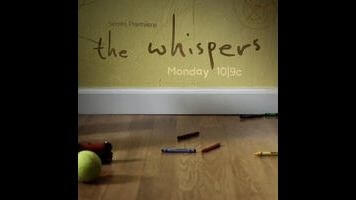In Ray Bradbury’s short story “Zero Hour,” children help aliens invade Earth. This information is not a spoiler, although Bradbury plays coy for most of the tale. It’s obvious from the start that something is up, and much of the creepy, spine-tingling pleasure of the work is in knowing the kids, with their “imaginary” friend Drill, are up to no good, even as their parents dismiss their antics as youthful nonsense.
But first, the good news: The Whispers fits neatly into the “weird shit” genre, a show whose biggest appeal lies in throwing out mysteries and inviting the audience to wait until those mysteries are eventually resolved. To that end, it’s a thoroughly conventional, competent piece of work. There isn’t much in the way of atmosphere (its smooth, manicured blandness feels like the kind of thing network television has been churning out since roughly 1993), but it’s hard to completely muck up the spookiness of a child having a very serious conversation with a creature who may or may not be real. From time to time, the familiarity even works in the series’ favor, as though a standard procedural got invaded by creatures from beyond.
As for the plot, it’s not startlingly original, but it’s dealt out smoothly enough. The only time the first three episodes seriously drag is when they get bogged down with character drama, and even that’s not as painful as it could have been. We’re introduced early on to the concept of some mysterious force manipulating the children of government officials, inspiring risky and potentially treasonous behavior for reasons that aren’t immediately clear. Over and over again, kids tell increasingly harried adults that it’s all for the “Game,” although one of the rules of the Game is that you aren’t supposed to talk about the Game, which is a perfect rule for Fight Clubs and television shows that need to draw out the mystery for more than a single episode.
Minor frustrations aside, at least The Whispers appears to have a clear destination in mind. Answers are doled out slowly, but steadily. The question is whether that destination is one that viewers are going to want to arrive at. Which is impossible to answer in advance, but one thing’s for sure: The passengers along for the ride are not enough to make the journey a memorable one. Like most TV shows, this one has a group of main characters involved in the action, and they’re about as interesting as the empty air the children stare at when they’re supposed to be talking to Drill.
There’s the troubled FBI agent, working with a skeptical (also troubled) partner. There’s the Department Of Defense guy whose job starts to converge on his troubled home life. There are the kids, of course, but little effort is made to define them as individuals: One is slightly cuter, one is slightly older, one is deaf. And there’s the mysterious man who may be the key to everything. These are archetypes with little flair, and none of them register as more than functional. Their squabbling and melodrama is only interesting when it becomes overheated enough to be laughable. While the interpersonal tensions become more relevant as the show goes on, there’s still something flat to all of it. Some genre shows have strong enough casts and characters that they’d be enjoyable even without the genre elements. This is not one of those shows.
The result is a series without a charismatic rooting interest, a narrative in which it’s much easier to root for the invisible Big Bad than it is for the nominal leads. The Whispers is a show with a very specific sort of audience in mind: People who are so intrigued by the questions that they’re willing to overlook the emptiness of whoever’s doing the asking.


 Keep scrolling for more great stories from A.V. Club.
Keep scrolling for more great stories from A.V. Club.